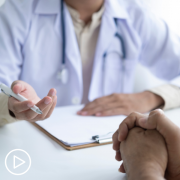AML Research: What’s New in Treatment?
AML expert, Dr. Jessica Altman, discusses the future of AML research, and new learnings that continue to improve current treatment approaches.
Dr. Jessica Altman is Director of the Acute Leukemia Program at Robert H. Lurie Comprehensive Cancer Center of Northwestern University. More about Dr. Altman here.
See More From The Fact or Fiction? AML Series
Related Resources

Misconceptions in Clinical Trials: What’s Fact and What Fiction? |

|

AML Treatment Treatment Side Effects: What’s Fact and What’s Fiction? |
Transcript:
Patricia:
Are there any new treatments on the horizon that you can talk about, Dr. Altman?
Dr. Altman:
Absolutely. So, I love to talk about new therapies in AML. Until the last couple of years – it had been 40 years since we approved a sustained treatment in the marketplace in AML. We had been treating the disease the same. And over the last couple of years there have been a growth of therapies. We’re now trying to sort out exactly when we’re using one over another. We also have clinical trials where we’re combining novel therapies for adults with either newly diagnosed disease or relapsed and refractory disease.
We are in an era of looking out at antibody therapy in AML – that’s one of the new waves of treatment. We are still exploring targeting therapies in the sense of inhibition of FLT3, IDH, and other mutations. So, it’s an era where there’s lots of excitement, and I’m hopeful for our patients.
Patricia:
Yeah. Tell me what makes you most hopeful about the future of research in this area, and treatment?
Dr. Altman:
So, I think that’s a great question. I think the fact that we now – the deeper the understanding we have of the biology of the AML, why AML happens, what mutations drive the disease, and then how to target those mutations with individual therapies is what excites me the most. So, our basic science research has exploded, and that occurs at a very quick pace, and that’s allowing us to develop therapies at a much faster rate than I would have anticipated before.
Patricia:
What a wonderful way to end our chat. Thank you so much, Dr. Altman, for taking the time to join us today.
Dr. Altman:
It’s a pleasure to be here. Thank you so much.










